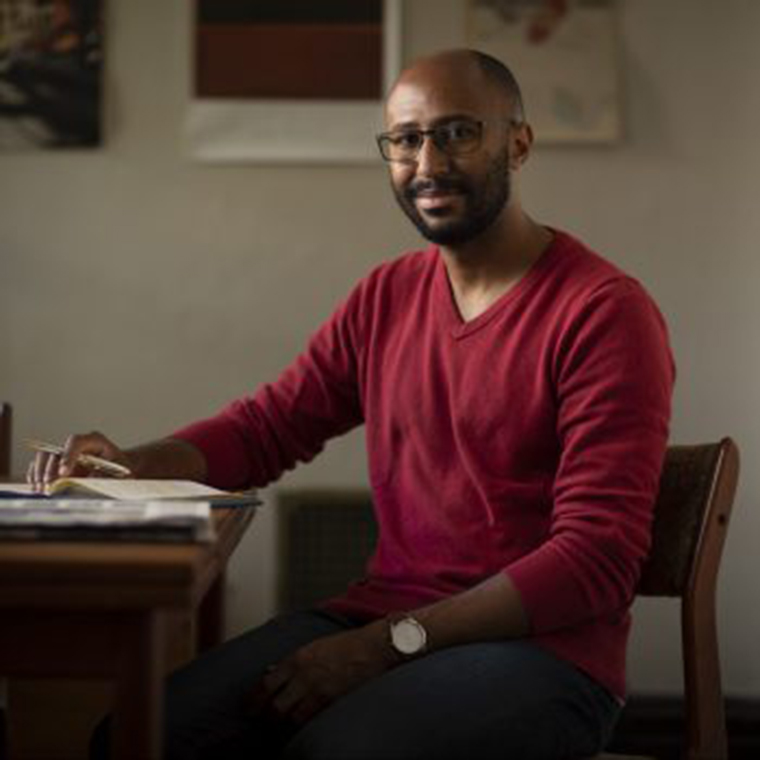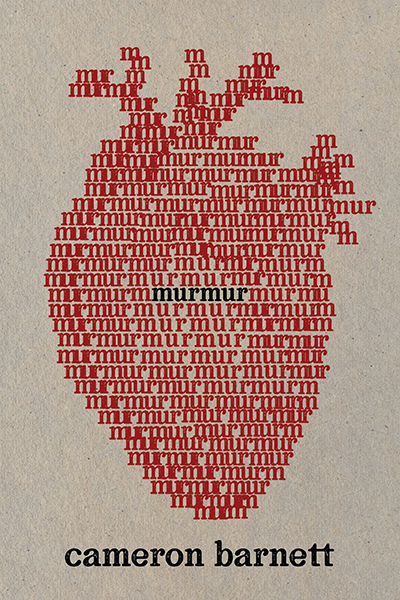We use cookies to improve our services and remember your choices for future visits. For more information see our Privacy Policy and Terms of Use.
A Web-Exclusive Poem from Cameron Barnett’s New Collection
Murmur: “Grandpa’s Gavel”
We are celebrating the release of Cameron Barnett’s second book of poetry, Murmur, out today from Autumn House Press, with an exclusive online publication of “Grandpa’s Gavel.” Cameron’s new poetry collection considers the question of how we become who we are.
Click the play button below the title to listen to a recording of the poem by Cameron Barnett.
Grandpa’s Gavel
I am mad at the red shelf for how tenderly it holds the finished wood of my grandpa’s gavel because, really, I am ashamed to hold it, afraid my hands don’t carry tenderness quite the same, so when I do gather the sense to stand and face it, my palm unfurled over the handle like a rain cloud, it’s not lost on me how I darken its sheen. I take it into my hand, and it’s now 1959 and I’m in the room: NAACP gathered, Grandpa pounding the sounding block to call order—here, big decisions get made; here, activism happens, ingrained into mallet and memory, and I am mad again, this time at how little I can see from my clouding of the room. Getting in my own way is my best trick; getting in Grandpa’s way is a new trick I try when I pry the gavel from him, and now it’s 1975 and I’m in his church watching righteousness rain down from his every word, so I bow low in the back pew and pray to be less shadow here and more snow—yes, pray that I may accumulate, not obfuscate; yes, I pray his prayers don’t find me here, unable to face him, his beautiful words, his heart so set on justice. So I pick up his gavel once more, and now we are caught in a SoCal sunset, and time has wrinkled him, and time has also brought me to be, and this time he doesn’t lift a gavel, but a grandson, his second one. Does he second- guess his life’s work, entrusted to this careful boy? Does he notice the clouds gathering where the sun makes its exit? Do I notice, as my hand moves for the gavel again, how tenderly he held me, as if this were inheritance, as if something in me spoke carefully of a place to rest his soul? Is this why I can’t lift it, even now, even then? Is this why the curl of my hand around the stained maple reminds me of a fist, and recoil rips through my veins? Pop, I want to be brave like you, but even a taillight can kill these days; these days, the bullets and bombs you dodged in church have followed us to schools and streets and theaters and stores and squares, and it’s like a cloud hangs over the world all the time, and I am just scared of holding this weight. The world eats me alive and never knows it. Could I ever have an ounce of your courage? Could I face myself and all the prayers you placed in me, raining over a world awash in chaos? I take this gavel, and all I am is right here. I’m brave enough to do that. I’m brave enough to be, for you, a bridge, perhaps. You were called to be strong so that I might be your tenderness, but is this enough? Is this enough? A question I weigh each time I grasp this gavel, each time I place it back on the red shelf, each time I pass by with a clouded heart hoping for release, hoping to get a grip, hoping to lift you up one day just the way you deserve.
“Grandpa’s Gavel” is from Murmur. Reprinted by permission of Autumn House Press. Copyright © 2024 by Cameron Barnett.

CAMERON BARNETT
© Joshua Franzos
Cameron Barnett is a poet and teacher from Pittsburgh. He is the author of Murmur and The Drowning Boy’s Guide to Water, the winner of the Autumn House Press Rising Writer Prize and a finalist for an NAACP Image Award. He is a graduate of Duquesne University and earned an MFA in creative writing from the University of Pittsburgh. Other honors include a 2019 Carol R. Brown Creative Achievement Award for Emerging Artist and serving as the ’22-’24 Emerging Black Writer in Residence at Chatham University. Cameron teaches at his middle-school alma mater, Falk Laboratory School. His work explores the complexity of race, place, and relationships for Black people in America.
We’ll mail you a free copy of this month’s issue. Plus you’ll get full online access—including more than 50 years of archives.
Request a Free Issue